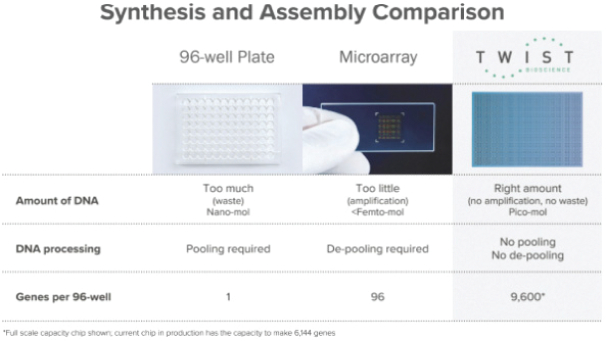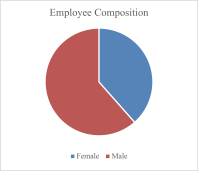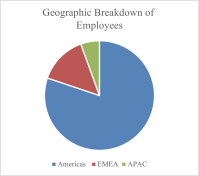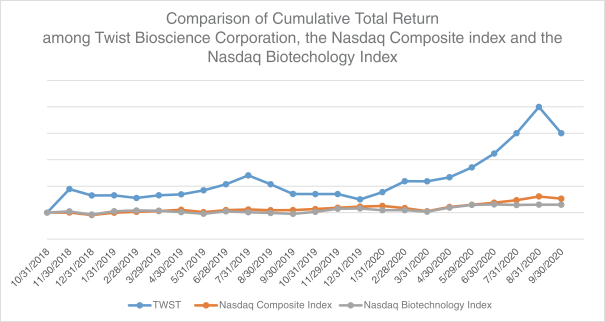We operate in a highly competitive industry and if we are not able to compete effectively, our business and operating results will likely be harmed.
We face competition from a broad range of providers of core synthetic biology products such as GenScript Biotech Corporation, GENEWIZ (owned by Brooks Automation), Integrated DNA Technologies, Inc. (owned by Danaher Corporation), DNA 2.0 Inc. d/b/a/ ATUM, GeneArt (owned by Thermo Fisher Scientific Inc.), Eurofins Genomics LLC, Sigma-Aldrich Corporation (an indirect wholly owned subsidiary of Merck & Company), Promega Corporation, OriGene Technologies, Inc., Blue Heron Biotech, LLC and others. Additionally, we compete with both large and emerging providers in the life sciences tools and diagnostics industries focused on sample preparation for NGS such as Thermo Fisher Scientific Inc., Illumina, Inc., Integrated DNA Technologies, Inc., Agilent, and Roche NimbleGen, Inc. In the antibody discovery market, we compete with clinical research organizations, such as LakePharma (mouse hybridoma, llama immune libraries, XOMA phage display library) and Aldevron, LLC (genetic mouse immunization coupled with hybridoma), and antibody discovery biotechnology companies, such as Iontas (human phage display libraries, human phage display library focused on ion channels), Adimab (human synthetic yeast display libraries), and Distributed Bio (human synthetic phage display library, lead optimization libraries). In the field of DNA digital data storage, we compete with Catalog Technologies, Inc., ETH Zurich, Helixworks, Iridia, Inc., North Shore Bio and Roswell. We may not be successful in maintaining our competitive position for a number of reasons. Some of our current competitors, as well as many of our potential competitors, have significant name recognition, substantial intellectual property portfolios, longer operating histories, greater resources to invest in new technologies, substantial experience in new product development and manufacturing capabilities and more established distribution channels to deliver products to customers than we do. These competitors may be able to respond more quickly and effectively than we can to new or changing opportunities, technologies, standards or customer requirements. Our competitors may develop disruptive technologies or products that are comparable or superior to our technologies and products. In light of these advantages, even though we believe our technology is superior to the products offerings of our competitors, current or potential customers might accept competitive products in lieu of purchasing our products. Increased competition is likely to result in continued pricing pressures, which could harm our sales, profitability or market share. Our failure to continue competing effectively or wining additional business with our existing customers could materially and adversely affect our business, financial condition or results of operations.
We may be subject to significant pricing pressures.
Over time, increasing customer demand for lower prices could force us to discount our products and result in lower margins. The impact may be further exacerbated if we are unable to successfully control production costs. Alternatively, if due to rising market prices, our suppliers increase prices or reduce discounts on their supplies, we may be unable to pass on any cost increase to our customers, thereby resulting in reduced margins and profits. Furthermore, changes in our product mix may negatively affect our gross margins. Overall, these pricing pressures may adversely affect our business, financial position and results of operations.
Ethical, legal and social concerns surrounding the use of genetic information could reduce demand for our technology.
Our products may be used to create DNA sequences of humans, agricultural crops and other living organisms. Our products could be used in a variety of applications, which may have underlying ethical, legal and social concerns. Governmental authorities could, for safety, social or other purposes, impose limits on or implement regulation of the use of gene synthesis. Such concerns or governmental restrictions could limit the use of our DNA synthesis products, which could have a material adverse effect on our business, financial condition and results of operations. In addition, public perception about the safety and environmental hazards of, and ethical concerns over, genetically engineered products and processes could influence public acceptance of our technologies, products and processes. These concerns could result in increased expenses, regulatory scrutiny, delays or other impediments to our programs.
36







